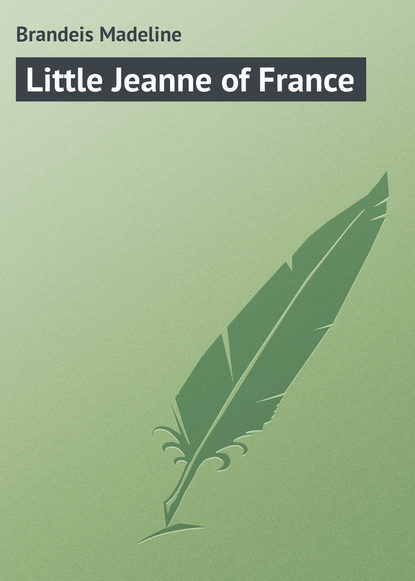По всем вопросам обращайтесь на: info@litportal.ru
(©) 2003-2024.
✖
Little Jeanne of France
Настройки чтения
Размер шрифта
Высота строк
Поля
"Poor Madame!" he sighed, as he finished reading. "She does not give up hope, even through all these years."
And he thought of the little black figure which soon would step from the big, glossy car. She would take what comfort this poor family could provide. She would make happy the Major's children with gifts and toys. Her simple room would be generously paid for.
Then Madame would leave them, and to the near-by cemetery she would go. She would visit it, before starting the journey homeward to Paris and to her little Margot. Usually these visits of Madame Villard occurred after a tour of the country. Those tours took her into very many villages of France, and always for the same purpose – always for a possible sign, a tiny clue of her lost grandchild.
"Madame is here," called the Major's youngest. "The big bright car is outside. See! Madame is coming in."
A flock of eager youngsters gathered about the little lady. She kissed them all and then sat down in the coolness of the Major's hallway.
"I have traveled far," she told the Major, after they were settled comfortably. The Major's children were outside in their arbor opening wonderful packages.
The Major's children were not starved for play. True, Madame Villard was the only one who gave them shop toys. But their playthings were the brooks of the forest, the little farm animals, and sticks and stones.
Happy little d'Artrots! The Major did not worry because they were so poor. They had plenty of time for play.
"Through Verdun (vĕr-dŭn´) and Reims (rēmz) and the valley of the Meuse (mūz) I have traveled, dear Major d'Artrot," said Madame Villard. "My travels have now become a habit. There is surely no more hope. But on and on I go."
Major d'Artrot took her hand. "You must not say that, dear Madame," he answered. "There is always hope. And remember what joy you bring with your visits to us. We are always so glad to see you."
Madame thanked the Major and smiled.
"You are kind," she said. "I am always happy here with you and with your little dear ones. But this time my visit is to be short. I must leave for Paris to-morrow."
"So soon? That is a pity," the Major said.
"No," smiled Madame Villard. "My little Margot's birthday is coming soon. I have promised to return and see to a very important part of her celebration."
Madame Villard's eyes were now twinkling. "Can you guess what that very important part might be for a young miss and her birthday?"
"No, I am afraid I do not know," the Major said.
"Well, dear Major, the young miss is to have a party frock which Grandmother will give her. Now do you admit that is a most important part of any young lady's birthday celebration?"
"Yes," laughed Major d'Artrot, "very important and serious!"
Then Major d'Artrot pulled a little card out of his pocket and showed it to Madame.
"And since Mademoiselle (mȧd-mwȧ-zĕl´) Margot is to have a beautiful frock," he said, "why do you not take her to this old friend of mine who makes some of the loveliest frocks in Paris?"
Madame Villard read the card and then looked up at the Major questioningly.
He continued, "Suzanne Moreau lived in the village adjoining my farm before that village was destroyed by the enemy. She was a demure little dressmaker, and we knew her, my wife and I, as a kindly and lonely soul. Now as you see by this card, she has established a fashionable children's shop in your Paris. She is still a kindly, modest little woman. Her whole life is centered in that small niece of hers, Jeanne, who is called the 'Little Model.' Have you, perhaps, heard of her?"
Madame Villard nodded and looked again at the card.
"Auntie Sue's Shop," she read.
"Yes, indeed," she answered, "I have heard. But Margot and I have never been to the shop. Now since I know that they are friends of yours, we will surely go."
"Ah, you are kind," said the Major. "Auntie Sue deserves what little one can do to help. She is struggling alone and works very hard. I assure you, dear Madame Villard, that she is a most deserving and honest person."
"I believe that," smiled Madame, patting the Major's hand. "For to be a friend of yours, one is obliged to be deserving, honest, and kind."
CHAPTER VIII
THE GUIGNOL
Auntie Sue watched Jeanne as she skipped along to school. There could not possibly have been a happier skip. There could not possibly have been a happier little face than the one Auntie Sue had just kissed.
But yet as Jeanne turned the corner, Auntie Sue felt something sad inside of her.
Something said to her, "She is not really happy. Other children are happy, but Jeanne is not a child. She is a puppet – a puppet."
Suzanne rushed into the shop and tried to shut out those thoughts. And Jeanne skipped along to school.
Strange to say, Jeanne was thinking of puppets, too. But she was not thinking of them in the same way as was Auntie Sue.
She was thinking of the puppet show in the park. This puppet show is called a Guignol (gēn´-yōl) in France and the park where it is played is the Champs Elysées.
On nearly every corner of this beautiful park is a Guignol. Where there is no Guignol, there is a swing, or there are donkeys to ride or goat carts. Children are amused in Paris.
Jeanne often passed the park, but the amusements there were not for her. Jeanne had no time for Guignols and donkeys and goat carts. Jeanne had to go to school and from school to help Auntie in the shop.
The donkeys and swings and other amusements did not attract Jeanne so much. But oh, how she loved the Guignol! Very often she would stop outside the tall gates and watch for ever so short a time.
And when the children cried out, "There he is! There he is!" as they do when the wicked policeman pops up his puppet head, Jeanne would shout with them.
She loved those silly little puppets. She knew them all just by passing them each day.
There was Guignol, the bad boy. He was the one all the children loved. There was the policeman; and how they hated him! There was a funny lady with a wobbly hat, which was always knocked off; and her hair would all fall down.
There were others. There was a pale, very pale boy they called Pierrot (pyĕ-rō´) which, in French, means "clown."
Jeanne felt sorry for him because he was very old and paintless and torn. They never gave him a fresh coat of paint nor mended his suit. Poor Pierrot!
Jeanne knew those stories by heart, too. There was the story of the milkman. The bad boy drinks all the milkman's milk, while sending him on useless errands.
There was "The Mattress," the story in which Guignol has a dream right up on the tiny stage. Guignol, by the way, is just like our American Punch, a puppet of the Punch and Judy show.
There were a few other stories, but they were always the same. Jeanne thought of many new stories. She wondered why the children didn't grow tired of having the same stories all the time. Jeanne could make up others – and she did – while she skipped to school. She made them up while she walked about the shop showing Auntie's little models.
To-day was a very fine day. When school was over, Jeanne found a group of children in bright-colored clothes, watching the Guignol. How sweet and pretty they looked sitting under the trees in their dainty clothes!
Jeanne leaned against a tree. It was early yet. She might watch one Guignol play.
The play was "The Thief." Guignol gives a lady a rose. She puts it in her hair under the large, floppy hat.
Then Guignol dances for her. It is a clumsy dance, and he trips. The children laugh. He gallops clumsily off the stage. Pierrot tiptoes in from the other side.
And he thought of the little black figure which soon would step from the big, glossy car. She would take what comfort this poor family could provide. She would make happy the Major's children with gifts and toys. Her simple room would be generously paid for.
Then Madame would leave them, and to the near-by cemetery she would go. She would visit it, before starting the journey homeward to Paris and to her little Margot. Usually these visits of Madame Villard occurred after a tour of the country. Those tours took her into very many villages of France, and always for the same purpose – always for a possible sign, a tiny clue of her lost grandchild.
"Madame is here," called the Major's youngest. "The big bright car is outside. See! Madame is coming in."
A flock of eager youngsters gathered about the little lady. She kissed them all and then sat down in the coolness of the Major's hallway.
"I have traveled far," she told the Major, after they were settled comfortably. The Major's children were outside in their arbor opening wonderful packages.
The Major's children were not starved for play. True, Madame Villard was the only one who gave them shop toys. But their playthings were the brooks of the forest, the little farm animals, and sticks and stones.
Happy little d'Artrots! The Major did not worry because they were so poor. They had plenty of time for play.
"Through Verdun (vĕr-dŭn´) and Reims (rēmz) and the valley of the Meuse (mūz) I have traveled, dear Major d'Artrot," said Madame Villard. "My travels have now become a habit. There is surely no more hope. But on and on I go."
Major d'Artrot took her hand. "You must not say that, dear Madame," he answered. "There is always hope. And remember what joy you bring with your visits to us. We are always so glad to see you."
Madame thanked the Major and smiled.
"You are kind," she said. "I am always happy here with you and with your little dear ones. But this time my visit is to be short. I must leave for Paris to-morrow."
"So soon? That is a pity," the Major said.
"No," smiled Madame Villard. "My little Margot's birthday is coming soon. I have promised to return and see to a very important part of her celebration."
Madame Villard's eyes were now twinkling. "Can you guess what that very important part might be for a young miss and her birthday?"
"No, I am afraid I do not know," the Major said.
"Well, dear Major, the young miss is to have a party frock which Grandmother will give her. Now do you admit that is a most important part of any young lady's birthday celebration?"
"Yes," laughed Major d'Artrot, "very important and serious!"
Then Major d'Artrot pulled a little card out of his pocket and showed it to Madame.
"And since Mademoiselle (mȧd-mwȧ-zĕl´) Margot is to have a beautiful frock," he said, "why do you not take her to this old friend of mine who makes some of the loveliest frocks in Paris?"
Madame Villard read the card and then looked up at the Major questioningly.
He continued, "Suzanne Moreau lived in the village adjoining my farm before that village was destroyed by the enemy. She was a demure little dressmaker, and we knew her, my wife and I, as a kindly and lonely soul. Now as you see by this card, she has established a fashionable children's shop in your Paris. She is still a kindly, modest little woman. Her whole life is centered in that small niece of hers, Jeanne, who is called the 'Little Model.' Have you, perhaps, heard of her?"
Madame Villard nodded and looked again at the card.
"Auntie Sue's Shop," she read.
"Yes, indeed," she answered, "I have heard. But Margot and I have never been to the shop. Now since I know that they are friends of yours, we will surely go."
"Ah, you are kind," said the Major. "Auntie Sue deserves what little one can do to help. She is struggling alone and works very hard. I assure you, dear Madame Villard, that she is a most deserving and honest person."
"I believe that," smiled Madame, patting the Major's hand. "For to be a friend of yours, one is obliged to be deserving, honest, and kind."
CHAPTER VIII
THE GUIGNOL
Auntie Sue watched Jeanne as she skipped along to school. There could not possibly have been a happier skip. There could not possibly have been a happier little face than the one Auntie Sue had just kissed.
But yet as Jeanne turned the corner, Auntie Sue felt something sad inside of her.
Something said to her, "She is not really happy. Other children are happy, but Jeanne is not a child. She is a puppet – a puppet."
Suzanne rushed into the shop and tried to shut out those thoughts. And Jeanne skipped along to school.
Strange to say, Jeanne was thinking of puppets, too. But she was not thinking of them in the same way as was Auntie Sue.
She was thinking of the puppet show in the park. This puppet show is called a Guignol (gēn´-yōl) in France and the park where it is played is the Champs Elysées.
On nearly every corner of this beautiful park is a Guignol. Where there is no Guignol, there is a swing, or there are donkeys to ride or goat carts. Children are amused in Paris.
Jeanne often passed the park, but the amusements there were not for her. Jeanne had no time for Guignols and donkeys and goat carts. Jeanne had to go to school and from school to help Auntie in the shop.
The donkeys and swings and other amusements did not attract Jeanne so much. But oh, how she loved the Guignol! Very often she would stop outside the tall gates and watch for ever so short a time.
And when the children cried out, "There he is! There he is!" as they do when the wicked policeman pops up his puppet head, Jeanne would shout with them.
She loved those silly little puppets. She knew them all just by passing them each day.
There was Guignol, the bad boy. He was the one all the children loved. There was the policeman; and how they hated him! There was a funny lady with a wobbly hat, which was always knocked off; and her hair would all fall down.
There were others. There was a pale, very pale boy they called Pierrot (pyĕ-rō´) which, in French, means "clown."
Jeanne felt sorry for him because he was very old and paintless and torn. They never gave him a fresh coat of paint nor mended his suit. Poor Pierrot!
Jeanne knew those stories by heart, too. There was the story of the milkman. The bad boy drinks all the milkman's milk, while sending him on useless errands.
There was "The Mattress," the story in which Guignol has a dream right up on the tiny stage. Guignol, by the way, is just like our American Punch, a puppet of the Punch and Judy show.
There were a few other stories, but they were always the same. Jeanne thought of many new stories. She wondered why the children didn't grow tired of having the same stories all the time. Jeanne could make up others – and she did – while she skipped to school. She made them up while she walked about the shop showing Auntie's little models.
To-day was a very fine day. When school was over, Jeanne found a group of children in bright-colored clothes, watching the Guignol. How sweet and pretty they looked sitting under the trees in their dainty clothes!
Jeanne leaned against a tree. It was early yet. She might watch one Guignol play.
The play was "The Thief." Guignol gives a lady a rose. She puts it in her hair under the large, floppy hat.
Then Guignol dances for her. It is a clumsy dance, and he trips. The children laugh. He gallops clumsily off the stage. Pierrot tiptoes in from the other side.









